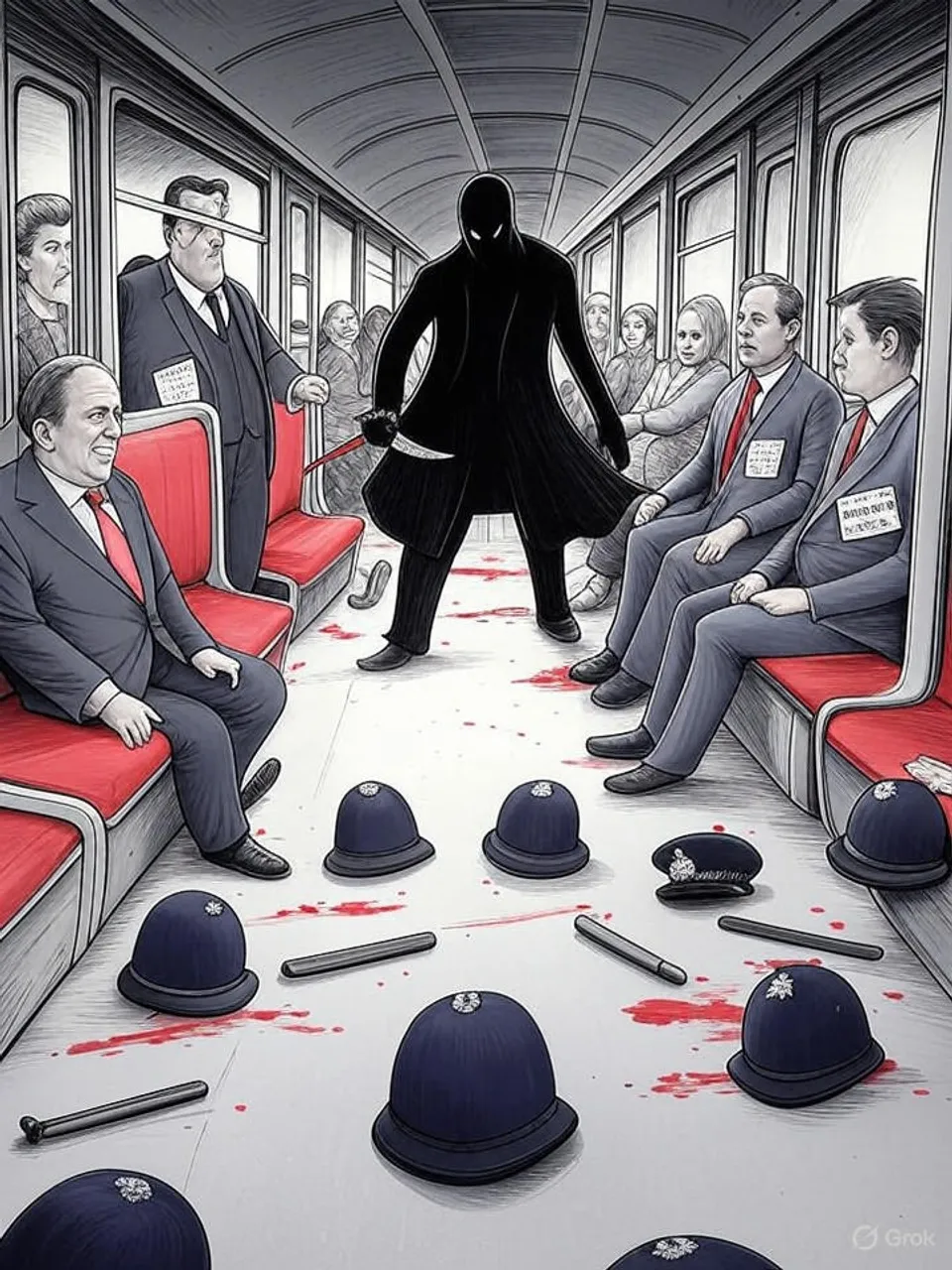Rampage on Rails Leaves Nine Bleeding, Officers Nowhere in Sight

Huntingdon train attack exposes transport policing's chronic invisibility amid rising knife violence
A knife rampage on a British train injures nine with life-threatening wounds, highlighting years of underfunding that has normalized violence on public transport despite cross-party pledges for more officers.
Commentary Based On
GB News
Huntingdon stabbing: Knife attack 'sad indictment of society' as incidents become 'more normalised'
A knife-wielding man injured nine passengers with life-threatening wounds on a high-speed train near Huntingdon, forcing an emergency stop and armed police deployment. British Transport Police arrested two British nationals, ruling out terrorism as the motive. Yet this attack underscores a stark reality: routine commutes now carry escalating risks, as police visibility on transport networks has eroded to near invisibility.
The incident unfolded aboard an Azuma train from Doncaster to London King’s Cross, shortly after departing Peterborough station on Saturday evening. Passengers faced a sudden rampage, with the attacker moving through carriages unchecked until the train halted. By Sunday, two victims remained in critical condition, while eight others recovered from severe injuries.
Security expert Chris Phillips, former head of the National Counter Terrorism Security Office, described the event as a “sad indictment” of British society. He noted that such knife attacks have become “more normalised,” with incidents rising across public spaces. Phillips highlighted the scarcity of British Transport Police officers, recalling he “couldn’t remember the last time” he saw one on a train.
This absence stems from years of resource cuts. Police forces, including transport units, have faced chronic underfunding since austerity measures took hold in 2010. Officer numbers dropped by over 20,000 in England and Wales between 2010 and 2019, with transport policing bearing disproportionate strain amid rising passenger volumes.
British Transport Police, responsible for securing 24 railway operators and over 3,000 stations, operates with just 3,000 officers for a network carrying 1.7 billion journeys annually. Visibility patrols have dwindled, replaced by reactive responses after crises erupt. The Huntingdon attack exemplifies this shift: armed units arrived swiftly post-incident, but no preventive presence deterred the assault.
Government responses repeat familiar patterns. In April, Prime Minister Keir Starmer announced a “Neighbourhood Policing Guarantee,” pledging 13,000 additional officers to end the “postcode lottery” in service delivery. Labour framed this as restoring security for “working people,” yet implementation lags, with recruitment targets unmet since similar Tory promises in 2019.
Cross-party failures compound the issue. Conservatives slashed police budgets by 19% in real terms from 2010 to 2015, while Labour’s early pledges for community policing faltered under fiscal pressures post-2008. Both sides prioritized short-term savings over sustained investment, leaving forces hollowed out. By 2023, knife crime in England and Wales hit 50,000 incidents, a 7% rise from the prior year, per Office for National Statistics data.
Public transport emerges as a flashpoint for this decline. Rail networks, privatized since 1993, prioritize profit over security, with operators resisting costs for enhanced patrols. The result: passengers endure “fire brigade” policing, as Phillips termed it—rapid but inconsistent intervention that fails to prevent normalization of violence. Commuters in urban and rural areas alike report diminished trust, with 2023 British Crime Survey data showing 15% fearing crime on public transport, up from 10% a decade ago.
Institutional accountability remains elusive. Superintendents praise response times, as in Huntingdon, but overlook systemic gaps. No minister has faced consequences for unfulfilled pledges; instead, leadership rotates without reform. This perpetuates a cycle where funding announcements substitute for action, benefiting political optics over citizen safety.
The Huntingdon stabbing reveals deeper rot in UK policing: a service starved across administrations, turning everyday travel into a gamble. As knife incidents surge 81% since 2013, ordinary Britons pay the price in blood and fear. Britain’s decline manifests not in grand failures, but in these quiet erosions of basic security, where promises dissolve and risks mount unchecked.
Commentary based on Huntingdon stabbing: Knife attack 'sad indictment of society' as incidents become 'more normalised' at GB News.